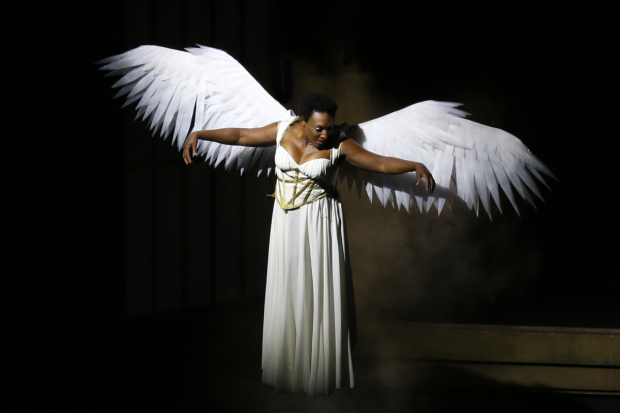Angels in America: Millennium Approaches
Two theaters collaborate to produce Tony Kushner’s double-barreled play.

(© Danisha Crosby)
Ever since it appeared in 1991, Tony Kushner's Pulitzer Prize- and Tony Award-winning Angels in America has been lauded by critics as a brilliant analysis of certain aspects of modern American life: stasis and change, independence and dependence, community and the lack thereof. More specifically, it has won praise for its straightforward attitude toward homosexuality and AIDS.
Now Round House Theatre and the Olney Theatre Center are coproducing Angels in America, having launched a muscular production of the first half, Millennium Approaches, in which eight actors take on over 20 roles. The second half, Perestroika, will open at Round House on September 25 and run in repertory with Part I.
Millennium Approaches begins in 1985, four years after HIV/AIDS appeared in the United States. The audience is introduced to two couples: a Mormon man and wife, Joe and Harper Pitt; and a young gay couple, Prior Walter and Louis Ironson, who have lived together for four years. Both couples are struggling to save their relationships.
Joe is secretly gay but can't admit it to anyone, even himself. Harper senses his secret. In her despair she has become addicted to valium, and is on the brink of madness. Prior has just discovered his first AIDS lesion and is terrified that Louis will leave him. Louis questions his ability to put up with the horrors of AIDS but also wonders how he can even think of abandoning the man he loves.
Jonathan Bock is superior, convincingly portraying Louis' conflicting emotions of love for Prior and fear of contracting HIV. Bock portrays Louis, a Jewish intellectual, as a man who easily and frequently gets lost in great, loopy discussions involving Biblical stories. Tom Story is delightful as Prior, acerbic and witty throughout, but always communicating Prior's disgust with his mortality.
Kimberly Gilbert is excellent as Harper, playing the role of a mad woman as an intelligent, sensitive human being. Thomas Keegan is a fine match for Gilbert, keeping her at arm's length as he struggles to confront his homosexuality.
One of the strongest characters in Millennium is the vile but powerful attorney Roy Cohn, played as the ultimate crass, wheeler-dealer by Mitchell Hébert. A closeted homosexual, Hébert is particularly good in his scene where he is diagnosed with AIDS and threatens his doctor and his practice unless he formally states that Cohn has liver cancer. Sarah Marshall is outstanding in all her roles, and is particularly poignant as the doctor.
Jon Hudson Odom skillfully plays Mr. Lies and Belize, the drag queen who ultimately cares for Prior. Dawn Ursula plays several critical roles, but none as important as the Angel who descends from Heaven at the end of Millennium, commanding humans to "stop moving," as their perpetual, erratic motions have disturbed the heavens.
Jason Loewith directs Millennium at warp speed, with rapid blackouts between scenes and very few pauses or full stops in the dialogue, only occasional changes in tempo. The result is a play that is exciting to watch and to hear.
James Kronzer's set creates a bank of huge, dirty, institutional windows across the top third of the stage, through which Clint Allen's projections can be seen: mountains in Antarctica, the head of President Reagan, red and white dots to represent red and white blood cells. Some of the action goes on below the windows, on a balcony above the stage. A long set of stairs stretches from that balcony to the stage. All these disparate elements work well together, increasing the disturbing sense of chaos and scattershot events that are main themes of the play.
Ivania Stack's costumes evoke the 1980s, with business suits for the men, skirts, and baggy sweaters for Harper. Prior gets silk pajamas and a stunning outfit with a hot-pink feather boa for one of his hallucinations. The Angel wears a stunning, larger-than-life cascade of white feathers.
As it examines the lives of four people on an intimate scale, Millennium also brilliantly reveals the boisterous, chaotic nature of America from the mid-1980s until about 1990. There is discussion of politics, Reagan's conservatism, political correctness, and the need for honesty. Its ability to interweave intimate stories of four individuals with stark revelations about massive social events makes Millennium far more than a play about AIDS. And with Loewith's skillful direction and his company's magnificent acting, this Millennium feels in no way dated. It sounds fresh, provocative, and relevant and will more than resonate with today's audiences.











